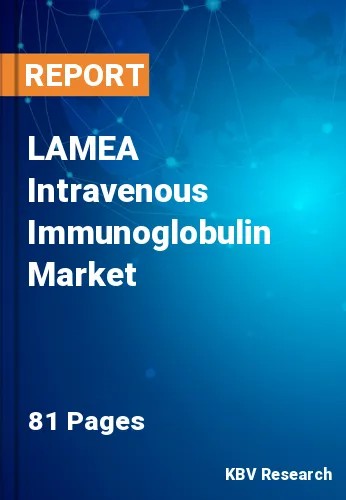The Latin America, Middle East and Africa Intravenous Immunoglobulin Market would witness market growth of 9.9% CAGR during the forecast period (2022-2028).
Immunoglobulin is found in the plasma of the blood. It contains antibodies that help it fight pathogens and disease. This component can be separated when people give blood. Then it'll be injected into a vein in the arm, known as an IV. If a person obtains IVIg, the immune system will be strengthened, allowing the person to fight infections and stay healthy. Liquid immunoglobulin is extracted from the blood plasma of healthy donors who have been screened. Serious illnesses like hepatitis and AIDS are evaluated in the plasma. Before being used for IVIg therapy, the plasma is cleansed.
Prepared immunoglobulin is infused into the veins throughout the therapy. A needle is used to enter the vein by a health care provider. The drug will then be injected into the arm through a tube from a bag. This can take anything from 2 to 4 hours. To receive therapy, the patient is most likely to go to an infusion center, hospital, clinic, or doctor's office. A medical practitioner may be able to treat a patient at home on occasion. Treatments are usually given every 3 to 4 weeks to keep the immune system robust.
The region's population is suffering from various types of diseases as well as witnessing an increase in mortality rate. This factor boosts the requirement of advanced medical technology like intravenous immunoglobulin in the medical sector of the region. The United Arab Emirates (UAE) is a rapidly evolving country with a diverse population with various educational backgrounds, religious beliefs, and cultural traditions, leading to more making of population-based public health policies. In the United Arab Emirates, a variety of public health issues play a significant role in morbidity and death.
The region has experienced considerable economic and industrial development, leading to an increase in the affluence of the Emirati population and a switch from a traditional lifestyle to a modern and technology-driven lifestyle marked by lowered occupational, household, and leisure-time physical activity, as well as excessive consumption of energy-dense convenience foods with low nutritional value.
The Brazil market dominated the LAMEA Intravenous Immunoglobulin Market by Country in 2021, and would continue to be a dominant market till 2028; thereby, achieving a market value of $305.4 million by 2028. The Argentina market is anticipated to grow at a CAGR of 10.5% during (2022 - 2028). Additionally, The UAE market would showcase a CAGR of 9.6% during (2022 - 2028).
Based on Distribution Channel, the market is segmented into Hospital Pharmacy, Specialty Pharmacy, and Others. Based on Application, the market is segmented into Immunodeficiency Diseases, Chronic Inflammatory Demyelinating Polyneuropathy, Hypogammaglobulinemia, Chronic Lymphocytic Leukemia & Myasthenia Gravis, Congenital AIDS & Multifocal Motor Neuropathy, Kawasaki Disease, Guillain-Barre Syndrome, Immune thrombocytopenia (ITP), and Others. Based on countries, the market is segmented into Brazil, Argentina, UAE, Saudi Arabia, South Africa, Nigeria, and Rest of LAMEA.
Free Valuable Insights: The Global Intravenous Immunoglobulin Market is Predict to reach $17.3 Billion by 2028, at a CAGR of 6.9%
The market research report covers the analysis of key stake holders of the market. Key companies profiled in the report include Grifols, S.A., Takeda Pharmaceutical Company Limited, Baxter International, Inc., Biotest AG (Tiancheng International Investment Limited), LFB S.A., CSL Limited (CSL Behring), Octapharma AG, Kedrion S.p.A, and Bayer AG.
By Distribution Channel
By Application
By Country
Our team of dedicated experts can provide you with attractive expansion opportunities for your business.

